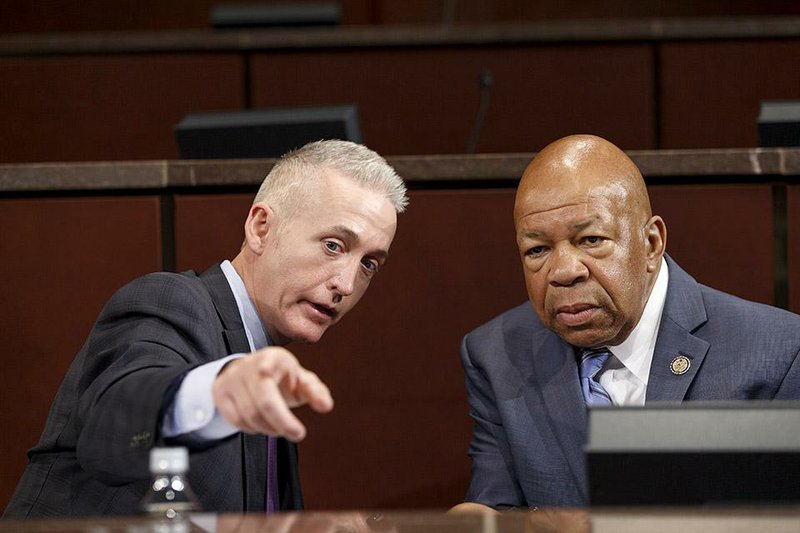WASHINGTON -- In the two years since Ambassador J. Christopher Stevens and three other Americans were killed in an attack on the U.S. Consulate in Benghazi, the State Department says it has overhauled its strategies for high-risk diplomatic posts overseas.
At the first public hearing of the House Select Committee on Benghazi, led by South Carolina Republican U.S. Rep. Trey Gowdy, officials said the State Department has implemented almost all of the nearly 70 recommendations provided to it in the aftermath of the Sept. 11, 2012, attack and is working to implement the rest.
Assistant Secretary for Diplomatic Security Greg Starr said the State Department has expanded its training for Foreign Service officers, provided more resources to high-risk diplomatic missions and partnered with the New York City Fire Department to deter fire risks at foreign posts.
In a progress report issued ahead of the hearing, the State Department detailed those efforts, saying it has created new diplomatic security positions and deployed 17 new Marine Corps detachments in conjunction with the Defense Department.
Noting that attacks on U.S. diplomatic missions date back decades, lawmakers on both sides of the aisle blasted the State Department for failing to implement changes before the attack at consulate in Libya. Gowdy pointed to recommendations from 1999, which were issued by an accountability board after several attacks on U.S. diplomatic missions in Africa.
"It is stunning to see the similarities in the recommendations made decades ago and the recommendations made after Benghazi," Gowdy said in his opening statement. "We do not suffer from a lack of recommendations. We do suffer from a lack of implementing and enacting those recommendations. ... So it is appropriate to review the [most recent] recommendations."
Convened by then-Secretary of State Hillary Rodham Clinton in the weeks after the Libya attack, the Benghazi Accountability Review Board offered a list of 29 recommendations, 24 of which are unclassified. Twenty-two of the recommendations, Starr said Wednesday, have been fully implemented, and the State Department is working to implement the other seven.
Those seven, Starr said, are more "evergreen" recommendations like language training programs, which will take sustained effort and time to complete.
The State Department said it followed the board's recommendation to create a "panel of outside independent experts (military, security, humanitarian) with experience in high-risk, high-threat areas to support (the department), identify best practices ... and regularly evaluate U.S. security platforms in high-risk, high-threat posts."
The department's independent panel produced its own set of nearly 40 recommendations. Members of that independent panel who testified before Gowdy's committee Wednesday also said nearly all of their suggestions had been implemented.
The hearing was the first public meeting of the Benghazi panel, the creation of which some people called a partisan move aimed at trying to discredit the Obama administration and Clinton, who is expected to run for president in 2016.
House Speaker John Boehner, R-Ohio, announced the panel's creation in May, and he tapped former South Carolina Solicitor Gowdy to lead it. Gowdy has shielded the panel's operation from the spotlight, seldom speaking publicly about the committee's work. As a former prosecutor, Gowdy has said he would rather run the investigation in private.
The idea for Wednesday's hearing, Gowdy's office said, came from one of the panel's Democrats, California U.S. Rep. Adam Schiff.
But several of the panel's Democrats said Tuesday that they remained concerned about the committee's lack of a clear mission or a timeline for the investigation. Noting that seven congressional committees already have examined the 2012 attack, they cautioned that the panel could be a waste of taxpayers' dollars.
U.S. Rep. Elijah Cummings, D-Md., echoed those concerns in his opening statement, but he applauded the panel for examining the State Department's post-Benghazi improvements as its first public act.
"We are about the business of trying to save lives. That's a very serious mission. I sincerely hope the Select Committee will stay on course of constructive reform and keep this goal as our north star. It would be a disservice to everyone involved to be lured off this path by partisan politics," Cummings said.
Gowdy, meanwhile, reaffirmed his commitment to an objective investigation.
"I remain hopeful that there are some things in our country that can rise above politics, and I remain convinced that our fellow Americans deserve the facts," he said.
A Section on 09/18/2014

